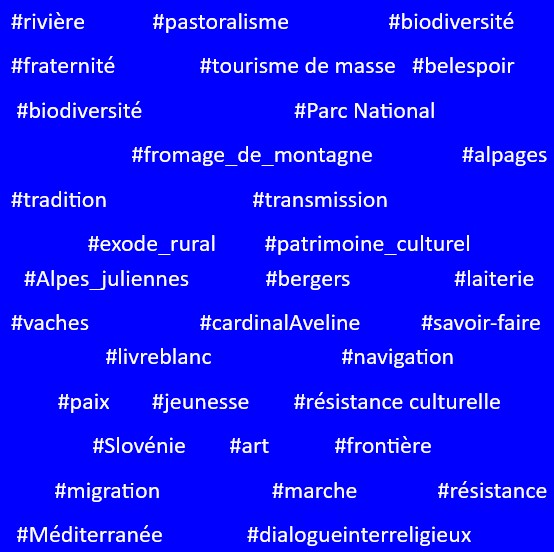Through threatened or crossed places, voices rise to maintain a connection. Around the Mediterranean, it is a march that refuses to forget. In Albania, mobilization to save one of the last wild rivers in Europe. In Slovenia, a shepherdess fights for the preservation of pastoralism. In the Mediterranean, a ship sails for peace with young people of all faiths and nationalities on board.
This article is a summary of the articles published this week in 22-med, available in the 11 languages used on the site. To read them in full: subscribe and support an independent media.
Inhabiting the Threshold: Tracing Ridhà Dhīb
Ridhà Dhīb, a Franco-Tunisian artist, makes walking a political and poetic performance. His projects – Ex-tracés, Conjuring the Threshold, Hor-I-zons – outline a lived geography where each border becomes memory and resistance. For him, walking is not just about moving forward: it is about invoking the absent, revealing buried traces, transforming the body into a living archive. From Paris to Mardin, he inscribes in asphalt the erased history of exiles; at the Greek-Turkish border, he ritualizes crossing, reminding that taking a step can become a subversive act. And when he returns to Tunisia, it is less a retreat than an opening, an inner crossing where mixed sounds and languages resonate. His art of slowness opposes a refusal to media urgencies: each step becomes memory and sensitive knowledge. Dhīb does not seek to represent, but to walk with. His works are not observed, they are inhabited – a call to cross rather than to contemplate.
From Threat to Hope: The Rescue of the Vjosa River
Long threatened by dams and diversions of tributaries, the Vjosa, the last wild river in Europe, has become a symbol of ecological resistance. In southern Albania, this 270 km river is home to over a thousand species, including the Balkan lynx. Its preservation has been driven by local and international mobilization, led by Olsi Nika and Besjana Guri from EcoAlbania, supported by NGOs like Riverwatch and EuroNatur, as well as personalities such as Leonardo DiCaprio. After years of campaigns and legal actions, the Albanian government established the Vjosa Wild River National Park in March 2023, a first in Europe. In 2025, this victory was honored with the Goldman Environmental Prize. But threats remain: tourism projects, river diversions, legal fragilities. The Vjosa reminds us that a river is not just a landscape, but a shared heritage. Its defense resonates as a message to the world: hope arises when civil society transforms crisis into victory.
A Shepherdess Facing the Disappearance of Alpine Pastures
In Planina v Lazu, in the Julian Alps, a single cabin still echoes with the bells of the herds. That of Lucija Gartner, 33 years old, the last shepherdess and cheesemaker of this Slovenian plateau. From June to September, she leads her cows, milks them, and transforms the milk into large golden wheels, perpetuating a tradition that is on the verge of extinction. Her story, which began as a child alongside her father, has become a silent struggle to keep alive a pastoralism that is disappearing everywhere. Every summer, Lucija welcomes children and teenagers like Aleksandra, 12 years old, who learn from her the gestures of milking and cheese-making. In this patient transmission, she sees a resistance to erasure. But the difficulties are immense: hard work, low profitability, rural exodus. The alpine pastures are emptying, the forest is encroaching. Yet, as long as she teaches, sells her cheeses, and introduces this way of life, Lucija maintains the idea that mountains should not be just frozen landscapes, but inhabited places. Her isolated cabin has become a symbol: that of a threatened culture, but still standing.
The Bel Espoir, a Ship for Peace in the Mediterranean
From port to port, the sailboat Bel Espoir weaves an unexpected brotherhood among young people from the five shores of the Mediterranean. Departing on March 1, 2025, for eight months of sailing and eight stops, this "boat for peace," which hosts groups of 25 young people (a total of 150 will have made a crossing), is much more than a symbol: it is a living laboratory where dialogue, cooperation, and communal living are experimented with. And this despite the headwinds of history and geopolitics. In September, it will reach Ravenna and Bari, then Naples before completing its journey on October 25 in Marseille, where it will be welcomed by an "Armada for Peace in the Mediterranean."
